Do you have elderly parents? There is no denying that there is a type of stigma around moving to an assisted living facility. Many seniors might view it as a serious blow to their independence. Understandably this is difficult to give up, no matter how old you are.
However, moving to an assisted living facility is quite the opposite. Yes, it’s a big adjustment for your elderly parents. But assisted living can actually improve an overall sense of independence, social interaction, and general well-being.
Granted, it’s a sensitive topic and a tough conversation to have. But there are ways to tackle it — here’s how.
Do Your Research Before Broaching the Topic
This is super important so that you can present the idea to your parents with thorough knowledge. It’s also a chance to approach the discussion with plenty of positive touchpoints that explain why assisted living could be beneficial.
Before you bring up the topic, do your research on the different types of assisted living available. As well as the different levels of care they provide and what your parents may need.
It’s also important to get a good idea of the cost of assisted living in your state, and whether you or your parents will be able to afford it. It’s crucial that you learn about your parent’s financial situation, and also be realistic about what they can or cannot afford.
All of the above information helps to minimize speculation in the minds of your parents (and yourself) and can help them understand what to expect.
Try To Approach the Subject Early On
The last thing your parents want or need is to feel like they’re being ambushed or pressurized into a huge life change. This is a surefire way for them to push back, and push back hard.
That’s why you don’t want to put off having this conversation for too long. In fact, you should make it part of an ongoing discussion about how they’re planning for their future. That way, the suggestion of assisted living may not come as such as surprise or shock.
Try to keep the conversation about it casual. Let them know that they don’t need to make any final decisions right away, but instead, it’s something for them to think about.
Keep Your Elderly Parents Involved
No matter how old your parents are, there is a high chance that they want a say in the type of future they have. Everyone wants to be able to choose where they live and spend their precious ”golden years”. That’s why it’s absolutely crucial to keep your parents in the loop when it comes to major decisions.
If they are in good health, ask them if they want to tour a few assisted living homes with you. This way they can get a feel for the facility and have their rightful say in the decision-making process.
Present the Idea in a Positive Manner
Transitioning to assisted living is a huge life change. If you think about it, your parents will have to move away from their family home, sell most of their possessions, and change their day-to-day routine. No matter how old you are, this type of lifestyle change is massive.
In order to soften the blow and make this change all the more bearable, you have to present the idea in the most positive light possible. Focus on the language you use and stick to affirming, non-threatening, and non-demeaning terms.
Don’t hint at a ”loss of independence”. Instead, talk about comfort, mention the amenities, refer to the positive aspects of social and community living. Be aware of using the term ”room” — try to use the terms condo or apartment, instead.
Your tone of voice is also impactful. Try to speak in a calm and pleasant tone. Remember that it’s always a two-way conversation. Always allow your parents to have their opinions and have their say.
Acknowledge the Big ”What Ifs”
Now, this part of the conversation is never easy, but there’s no way to avoid it. You have to talk about the major ”what if” situations that could face your parents in the future.
Some of these scenarios might include the death of a parent, leaving the other parent alone. Or, it might include the sale of your family home and what to do with all their possessions.
By having this conversation with your parents you can get an idea of their wishes, which can help you to make better decisions for their future — if you need to.
Recognize Why Your Parents Might Not Be Ready
If there was any time for empathy, it’s during this type of conversation with your parents. It’s important to acknowledge and recognize why your parent(s) might be resistant to the idea of moving to assisted living.
If you put yourself in their shoes, you might understand why they’re feeling so reluctant. While most seniors know, deep down, that assisted living is most likely their final residence, it’s still very difficult to come to terms with for many people.
Essentially, moving to an assisted living facility may signify the twilight or ”end of life” stage for your parents. For many, this is an impossible reality to face. So, have empathy and patience, and remember to keep your responses measured and tactful.
Understand Their Progression of Illness
If your parents are diagnosed with a chronic illness or condition, such as Alzheimer’s or Parkinson’s, this adds a whole other dimension to the discussion.
You want to do your own research on their specific condition and how it will progress. You need to learn about the type of care they’ll need and the best type of facility for this before you open up the discussion with them.
While it may be difficult, you want to openly discuss what could lie ahead for your parent(s), and be realistic about the type of care they’ll need. All in all, this research and reality check on both parts can help you to make the best-informed decision for their future.
Find Your Future With Parsons House
Do you have elderly parents that are looking for a warm, welcoming, and secure assisted living environment? Look no further than Parsons House on Eagle Run.
Based in Omaha, we are a family-owned award-winning Best of Omaha property that promises to provide an amazing quality of life for all seniors. We center our care on compassion and living life to the fullest.
If you’re interested in learning more about what we offer, explore our assisted living services here.
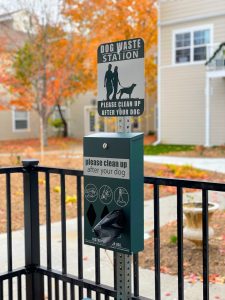
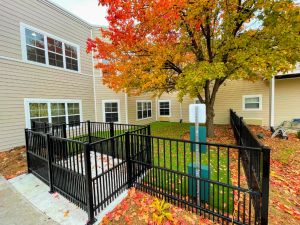


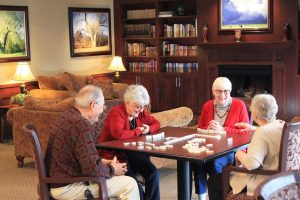 Fun activities in which to fill the day are an important part of lowering stress and increasing happiness. Make sure to investigate how many activities the facility offers, and how often a resident gets to participate in them.
Fun activities in which to fill the day are an important part of lowering stress and increasing happiness. Make sure to investigate how many activities the facility offers, and how often a resident gets to participate in them.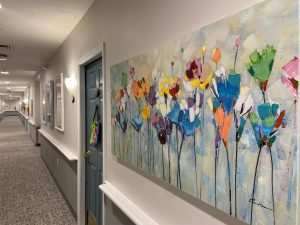
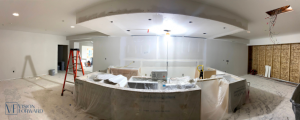
 Our award-winning Best of Omaha caregivers are often able to offer the type of service that simply couldn’t be provided at home. With unrivaled expertise in the Omaha area and a caring heart, we go above and beyond to provide your loved ones with the comprehensive care they deserve in a safe, nurturing environment.
Our award-winning Best of Omaha caregivers are often able to offer the type of service that simply couldn’t be provided at home. With unrivaled expertise in the Omaha area and a caring heart, we go above and beyond to provide your loved ones with the comprehensive care they deserve in a safe, nurturing environment.